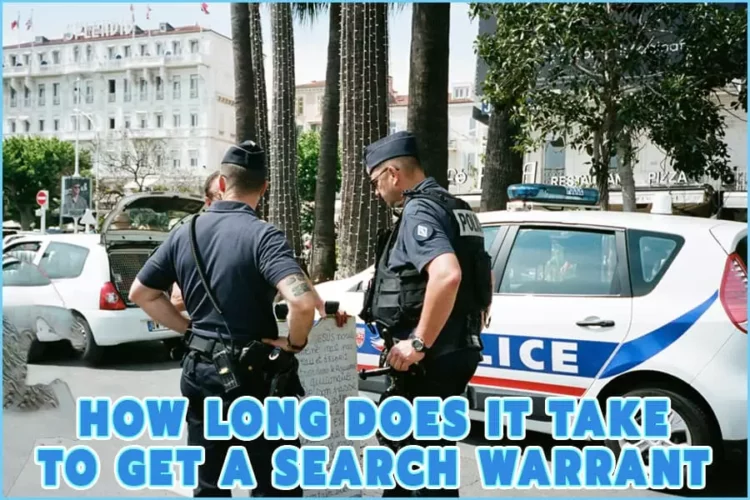How long does it take to get a search warrant? The law enforcement personnel cannot simply walk up at your door and demand to search your house.
Regardless of public sentiment, your associations, or your family members, they’ll first need a search warrant before entering your property.
However, the process of obtaining a search warrant is often shrouded in secrecy. But what does the process look like, and how long does it take? In this article, we’ll reveal the process and give you an idea of what you need to know. So,
How Long Does It Take To Get A Search Warrant?
It varies from a few hours to a few days. The most important factor determining how long it takes to get a search warrant is the credibility of the information.
The availability of a judge is another factor. And how quickly the police officers can convince the judge that a warrant is necessary. Once the judge issues a search warrant, law enforcement must use it within 10 days.
What Is A Search Warrant?
A search warrant is a document that a judge issues. It authorizes law enforcement personnel to search a specific location for evidence of a crime. Search warrants are a critical part of the criminal justice system.
The process of getting a search warrant can be complicated. It can take several days or even weeks for law enforcement to gather the evidence to present to the judge. Once they present the evidence, the judge will decide whether or not to issue the warrant.
A search warrant must be based on probable cause. Probable cause is a reasonable belief that police will find evidence of a crime at the specified location.
The officer requesting the warrant must have information that would lead a judge to believe it.
The document must describe the scene to be searched and the items to be seized. A judge must sign it and include the date and time it was issued.
The warrant must list the specific items that the officer is looking for and must base on probable cause.
The Fourth Amendment to the United States Constitution protects citizens from unreasonable searches and seizures.
Law enforcement officers must have a valid search warrant to search someone’s home, office, or car.
Unless otherwise specified, the execution of a search warrant can only be between 7 a.m. and 10 p.m. The law enforcement officer must also provide a copy of the warrant before searching a premise.
What Are The Steps For Getting A Search Warrant?
Getting a search warrant is fairly straightforward, but it can be time-consuming. It involves an application to a judge, presentation of evidence, and a review of the application by the judge.
Gathering Evidence
When a crime is suspected, the police department will begin its investigation. It usually starts with interviewing witnesses and the victim and collecting physical evidence at the crime scene. Most of it will include photos, video surveillance, paper trail, bank statements, etc.
Submitting An Application
The next step is to submit an application or an affidavit to a judge. The affidavit must include detailed information about the investigation and the specific items they seek to find.
This application must include evidence that there is probable cause. It must convince the judge that a crime has been committed. And that they’ll find the evidence at the specified location.
Review Of The Application
Once they have a solid lead, law enforcement will present their findings to a judge for a search warrant. The judge will review the application and determine whether or not to issue the warrant.
The process for getting a search warrant can vary depending on the jurisdiction. In some cases, the police department may be able to obtain a warrant electronically. However, most warrants are still issued manually.
What Are The Grounds For Getting A Search Warrant?
There are several grounds for getting a search warrant. The most common are probable cause, reasonable suspicion, and exigent circumstances. We’ll describe each of these in more detail below.
Probable Cause
Probable cause is the most common justification for getting a search warrant. The law defines it as “a reasonable belief that evidence of a crime will be found in a particular place.”
It’s a legal standard used in the US to determine whether law enforcement officials have a reasonable basis. The basis will be used to conduct a search, make an arrest, or seize property.
Law enforcement officers must present evidence that suggests that a crime has been, is being, or will be committed.
They should satisfy all these to meet the probable cause standard. This evidence can come in witness testimony, physical evidence, or recordings.
The judge must believe that the suspect has committed a crime. They must believe that evidence of that crime is likely to be found in the place to be searched.
The officer must also provide information about why they need the search warrant and how long it will be useful.
Reasonable Suspicion
Reasonable suspicion is less common. The law defines it as “a reasonable belief that a person has committed or is about to commit a crime.”
Authorities must have reasonable suspicion that the person or place they are targeting is involved in criminal activity.
They must base this suspicion on specific facts and rational deductions rather than just a hunch.
Second, the authorities must have reasonable suspicion that they will find any evidence of criminal activity at the location.
Exigent Circumstances
Exigent Circumstances are the rarest. It’s a situation in which time is of the essence, and there isn’t enough time to get a search warrant.
Therefore, law enforcement will issue a search without a warrant and without knocking on the door and announcing their presence.
However, according to the constitution, the exigent circumstance must have probable cause to become warrantless.
An exigent circumstance is an event, fact, or condition that makes it difficult or impossible to obtain a search warrant.
Courts have recognized certain circumstances as being so severe that they make it impossible to get a search warrant.
For example, if the suspect has fled the jurisdiction, it would be impossible to get a search warrant. Other examples of such circumstances include:
- The evidence is on the suspect’s computer
- The suspect may be fleeing the crime scene
- There is a risk of injury or death to officers or innocent bystanders if they don’t apprehend the suspect immediately.
- There is a risk that the suspect will escape if they don’t pursue it immediately.
- The suspect will destroy the evidence related to the crime if they do not search the premises immediately.
Sneak And Peek Warrant
A sneak and peek warrant is also known as a covert entry warrant. A judge issues it to allow law enforcement to enter a property to search for evidence secretly. Law enforcement will enter without notifying the owner in advance.
Law enforcement often uses a sneak and peek warrant in drug investigations. They may want to search for drugs or drug paraphernalia without giving the suspect time to destroy any evidence.
Gag Orders
In the context of law enforcement, a gag order is a court order prohibiting law enforcement from discussing an investigation. It protects the investigation, the people involved, and the victims. It can also prevent any potential jury bias.
In California, it concerns electronic search warrants and prohibits discussion of the details of these search warrants.
Reverse Search Warrants
In the United States, police enforcement obtains a court order for information from technology firms.
They usually do this to identify a group of persons who may be criminal suspects. Such a court order is known as a reverse search warrant.
Reverse search warrants are not the same as ordinary search warrants, usually issued for specific persons or premises.
Geo-fence Warrant
A geo-fence warrant allows law enforcement to track the location of a specific person or object. Authorities will most commonly use this warrant in kidnapping, child endangerment, or terrorism cases.
Police use mobile phone data to track a suspect’s movements. The warrant is issued when the police have “reasonable suspicion” that the suspect is involved in criminal activity.
The police can then use the data collected from the cellphone to create a “geo-fence” around the area.
Conclusion
This article looked at the question: how long does it take to get a search warrant? It can take a few hours to a few days to get a search warrant. The timeframe depends on the jurisdiction, the severity of the crime, and the judge’s availability.
If you find yourself in a situation where law enforcement seeks to search your premises, you should stay calm. Make sure to ask for a copy of the search warrant and contact a lawyer.










